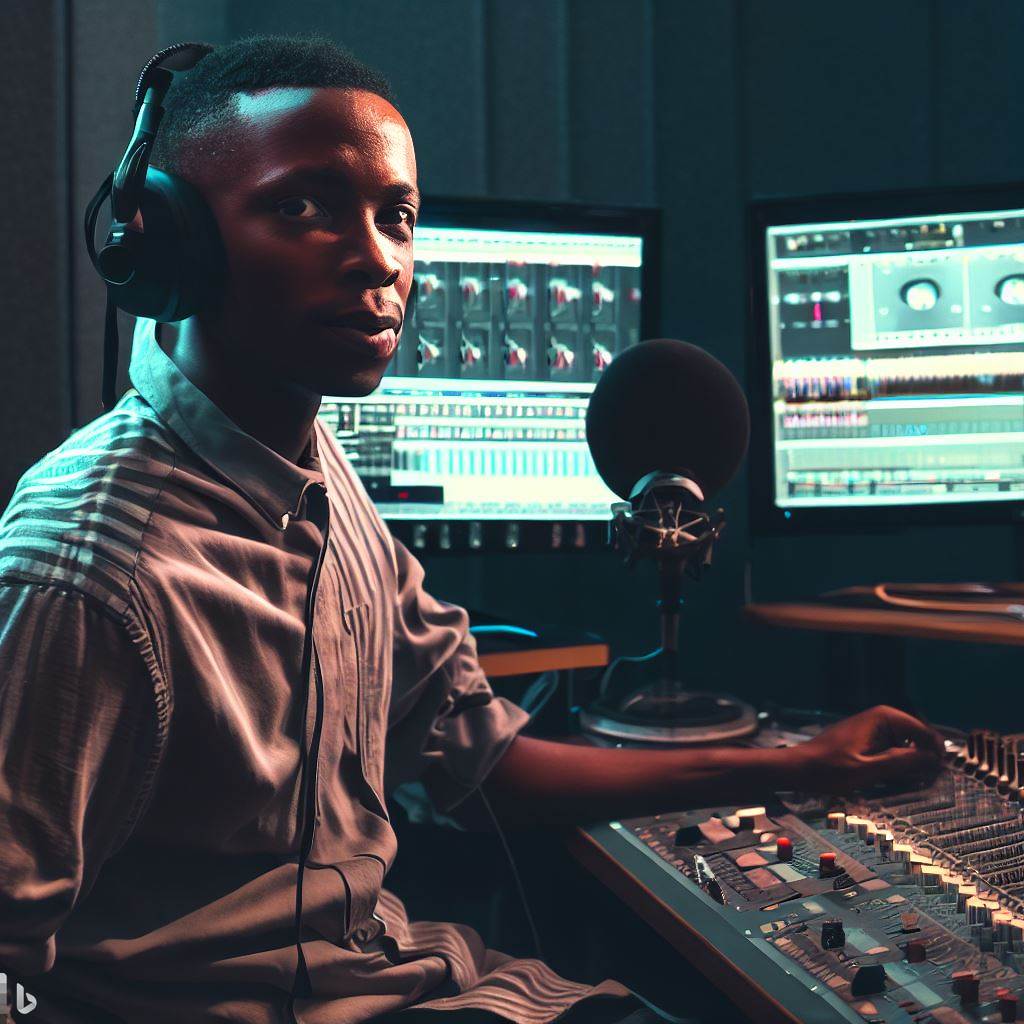Introduction
Music rights management in Nigeria is a crucial aspect of the music industry. Understanding how music rights are managed in the country is essential for artists, musicians, and stakeholders.
It is necessary to comprehend the significance and relevance of music rights management in Nigeria to protect the interests of creators and ensure fair compensation for their work.
Without a proper understanding of music rights management, artists may face challenges in monetizing their creativity and protecting their intellectual property.
Additionally, a comprehensive understanding of music rights management in Nigeria can help stakeholders navigate the complex legal landscape and ensure compliance with relevant regulations.
This post provides an overview of music rights management in Nigeria, highlighting its importance for the growth and development of the music industry in the country.
Overview of Music Rights Management
In the ever-evolving music industry, understanding music rights management is crucial for all stakeholders involved.
Let’s dive into what music rights management entails and the significant role it plays in the industry.
Defining music rights management and its role in the music industry
- Music rights management refers to the administration, protection, and exploitation of music rights.
- It involves overseeing the legal and business aspects of licensing, royalties, and copyright issues.
- Music rights management ensures that the appropriate parties receive compensation for the use of their works.
- It plays a vital role in the economic sustainability of the music industry.
- Without effective music rights management, artists and other creators might not receive their deserved income.
The importance of proper management of music rights for artists, songwriters, and producers
- Proper music rights management allows artists to control the use of their music and earn a fair income.
- It safeguards the intellectual property of songwriters and ensures they receive proper recognition and financial compensation.
- For producers, music rights management enables them to protect their investments and secure royalties.
- Without proper management, artists risk unauthorized use of their music and potential loss of income.
- Songwriters may face difficulties in having their works recognized and compensated appropriately.
- Producers may struggle to recoup their investments or receive fair compensation for their contributions.
Overall, music rights management is the foundation that supports and sustains the music industry.
It ensures that all parties involved, from artists to songwriters to producers, are fairly compensated for their creative contributions.
Read: Breaking Boundaries: Nigerian Music Producers in the International Scene
Music Rights in Nigeria
Music rights are essential in protecting the interests of creators, composers, and performers in Nigeria.
These rights encompass various aspects of music creation and performance, ensuring that artists receive proper recognition and compensation for their work.
In Nigeria, there are different types of music rights recognized, as well as a legal framework and regulations surrounding music rights management in the country.
Different Types of Music Rights
- Copyright: Copyright is the most fundamental music right that protects original musical works.
It grants exclusive rights to creators, including composers, lyricists, and producers, to control the reproduction, distribution, and performance of their works. - Performance Rights: Performance rights refer to the right to publicly perform a musical work.
In Nigeria, this right is administered by the Copyright Society of Nigeria (COSON) and ensures that artists receive royalties when their works are publicly performed. - Mechanical Rights: Mechanical rights relate to the reproduction and distribution of musical works through audio recordings.
These rights allow artists to grant licenses for the use of their music in albums, tapes, CDs, and digital platforms. - Synchronization Rights: Synchronization rights pertain to the use of music in conjunction with visual media, such as films, TV shows, and commercials.
These rights ensure that artists receive compensation when their music is synchronized with audiovisual content.
Legal Framework and Regulations
- Copyright Act: The Copyright Act is the primary legislation governing music rights in Nigeria.
It provides the legal basis for copyright protection, including musical works, performances, and sound recordings.
The act outlines the exclusive rights of copyright owners and the remedies available for copyright infringement. - Nigerian Copyright Commission (NCC): The NCC is the government agency responsible for copyright protection and enforcement in Nigeria.
It regulates the collective management of music rights through collective management organizations (CMOs) like COSON and the Musical Copyright Society of Nigeria (MCSN). - Collective Management Organizations (CMOs): CMOs play a crucial role in music rights management by collecting royalties on behalf of artists and ensuring fair distribution.
COSON and MCSN are currently the major CMOs in Nigeria, representing a vast number of artists and enforcing copyright laws. - Royalty Distribution: Royalty distribution is governed by regulations set by CMOs in collaboration with the NCC.
These regulations outline the process of collecting royalties from users of copyrighted music and distributing them to the rightful owners based on usage and agreed-upon criteria. - Enforcement and Dispute Resolution: The NCC, in collaboration with relevant authorities, is responsible for enforcing copyright laws and resolving disputes related to music rights.
This includes taking legal actions against infringers and providing avenues for mediation and arbitration.
In fact, music rights in Nigeria include copyright, performance rights, mechanical rights, and synchronization rights.
They are protected by the Copyright Act and regulated by the Nigerian Copyright Commission and collective management organizations.
By upholding these rights and enforcing the legal framework, Nigeria can ensure the fair treatment of artists and the growth of its music industry.
Read: Nigerian Music Publishers: Catalysts for Change
Collective Management Organizations (CMOs)
In this section, we will explore the concept of Collective Management Organizations (CMOs) and their crucial role in music rights management in Nigeria.
We will provide an overview of the major CMOs operating in the country and discuss their functions and responsibilities in protecting and enforcing music rights.
Definition of CMOs and Their Role
CMOs are organizations that represent the interests of music creators and rights holders.
They function as intermediaries between music creators and users, ensuring fair compensation for the use of copyrighted music.
Their role is vital in managing and licensing music rights, collecting royalties, and protecting the rights of music creators.
Overview of Major CMOs in Nigeria
Nigeria has several prominent CMOs, including the Copyright Society of Nigeria (COSON), the Musical Copyright Society Nigeria (MCSN), and the Performing Musicians Employers’ Association of Nigeria (PMAN).
COSON is one of the largest CMOs in the country, representing a wide range of music creators and rights holders.
MCSN focuses primarily on protecting the rights of composers, authors, and publishers, while PMAN represents the interests of performing musicians.
Functions and Responsibilities of CMOs
The primary functions of CMOs in Nigeria include:
- Collecting Royalties: CMOs collect licensing fees and royalties from various users of music, such as broadcasters, event organizers, and digital platforms.
They ensure that music creators receive fair compensation for their work. - Managing Licensing: CMOs grant licenses to users, allowing them to legally utilize copyrighted music.
They negotiate and establish licensing agreements, ensuring that copyrighted works are used in compliance with the law. - Monitoring and Enforcement: CMOs actively monitor the use of music to detect unauthorized usage.
They investigate cases of infringement and take legal action against infringers, safeguarding the rights of music creators. - Distribution of Royalties: CMOs distribute collected royalties to their members, ensuring that music creators receive their fair share based on the usage of their works.
They employ robust distribution mechanisms to track and allocate royalties accurately. - Advocacy and Education: CMOs play a vital role in raising awareness about music rights and advocating for favorable policies.
They educate music creators and users about copyright laws and the importance of proper music rights management.
Contribution to music industry in Nigeria
By performing these functions, CMOs contribute significantly to the development and sustainability of the music industry in Nigeria.
They provide a centralized system for licensing and royalty collection, streamlining the process for both music creators and users.
Furthermore, CMOs facilitate a fair and transparent environment for music rights management, protecting creators and encouraging creativity.
Their activities ensure that music creators receive adequate compensation for their work, motivating them to continue producing high-quality music.
In general, Collective Management Organizations (CMOs) are instrumental in ensuring effective music rights management in Nigeria.
Their role in licensing, royalty collection, enforcement, and advocacy provides a solid framework for the protection of music creators’ rights.
By working closely with CMOs, both music creators and users can contribute to a thriving music industry that respects and values intellectual property.
Read: Case Study: Successful Interpreters and Translators in Nigeria
Challenges in Music Rights Management in Nigeria
Key challenges faced by artists, songwriters, and producers in Nigeria regarding music rights management
In Nigeria, artists, songwriters, and producers face several key challenges in music rights management:
Piracy
One of the major challenges is the rampant piracy of music, which greatly affects artists’ revenue streams.
Piracy is perhaps the most significant challenge in music rights management in Nigeria.
The illegal reproduction and distribution of music through physical copies and online platforms deprive artists of their rightful earnings. This issue is exacerbated by the lack of strict enforcement measures.
Lack of awareness
Many artists, especially those in remote areas, lack awareness about their rights and how to manage them effectively.
Another major challenge is the lack of awareness among artists regarding their rights and how to manage them effectively.
Many artists, especially those from rural areas, are not adequately informed about copyright laws, licensing, and the importance of registering their works.
Limited legal protection
The existing legal framework in Nigeria does not provide adequate protection for music rights, making it challenging for artists to enforce their rights.
The role of digital platforms in music rights management cannot be ignored. While streaming services and online platforms offer new avenues for artists to reach wider audiences, they also present challenges.
Artists often struggle to understand the complexities of digital licensing and face difficulties in tracking and collecting royalties from these platforms.
Inefficient collective management organizations
The current collective management organizations in Nigeria have been criticized for their inefficiency and corruption, hindering proper rights management.
The collective management organizations (CMOs) responsible for overseeing music rights are plagued by inefficiency and corruption.
Artists have criticized these organizations for unfair distribution of royalties, delays in payments, and a lack of transparency.
These issues hinder proper rights management and discourage artists from entrusting their works to these organizations.
Complex licensing processes
Obtaining licenses for music usage is often a complex and bureaucratic process, causing delays and difficulties in collecting royalties.
The licensing processes in Nigeria are complex and bureaucratic, further compounding the challenges faced by artists.
Obtaining a license for music usage can be a tedious process, requiring artists to navigate through various regulations and pay substantial fees.
The cumbersome nature of these processes often leads to delays in collecting royalties.
Limited access to legal representation
Many artists, especially emerging ones, do not have access to affordable legal representation, making it hard for them to protect their rights.
Emerging artists, in particular, face limitations in accessing legal representation. Many cannot afford the high costs associated with hiring lawyers to protect their rights.
This vulnerability exposes them to exploitation and makes it difficult for them to assert their rights in cases of infringement.
Lack of enforcement mechanisms
The Nigerian government’s weak enforcement of copyright laws contributes to the challenges faced by artists in rights management.
The Nigerian government’s weak enforcement of copyright laws greatly contributes to the challenges faced by artists in rights management.
Without adequate measures taken to curb piracy and protect artists’ rights, their creative efforts remain undervalued and their livelihoods at risk.
Basically, artists, songwriters, and producers in Nigeria face multiple challenges in music rights management.
The prevalence of piracy, lack of awareness, inefficient collective management organizations, complex licensing processes, limited access to legal representation, and weak enforcement mechanisms all contribute to the struggle artists face in protecting and managing their rights effectively.
Read: A Day in the Life of a Nigerian Music Publisher

Impact of Music Rights Management on Artists and the Music Industry
Proper music rights management is essential for artists and stakeholders in the Nigerian music industry.
It not only benefits them individually but also contributes to the overall growth and development of the industry. Here are some key reasons why effective music rights management is crucial:
Protection of Intellectual Property
- Artists’ creativity and hard work deserve recognition and protection.
- Proper music rights management ensures that artists’ intellectual properties, such as songs and lyrics, are legally safeguarded.
- It helps prevent unauthorized use or exploitation of their work, which can result in financial losses and damage to reputation.
Royalty and Revenue Generation
- Effective music rights management helps artists earn fair compensation for their work.
- By managing their rights, artists can collect royalties from various revenue streams, including song sales, streaming, radio play, and public performances.
- These royalties serve as an important source of income, allowing artists to sustain their careers and invest in future productions.
Access to Global Markets
- Proper management of music rights opens doors to international opportunities for artists.
- Artists can license their music for use in films, commercials, video games, and other media globally.
- By expanding their reach beyond national boundaries, artists can gain exposure to new audiences and potentially increase their fan base.
Collaboration and Partnership Opportunities
- Effective management of music rights can lead to collaborations and partnerships.
- Artists with proper rights management are more attractive to record labels, distributors, and other industry professionals.
- This can result in opportunities for joint projects, endorsements, and sponsorship deals, further enhancing the artists’ career prospects.
Growth and Development of the Music Industry
- When artists benefit from proper rights management, the entire music industry flourishes.
- Increased revenue and recognition for artists lead to investments in production, promotion, and infrastructure.
- Record labels, promoters, and venues thrive, creating a robust ecosystem that nurtures emerging talents.
Preservation of Cultural Heritage
- Effective music rights management helps preserve and promote Nigeria’s rich musical heritage.
- By protecting and monetizing traditional songs and compositions, artists contribute to the preservation of cultural identity.
- They also facilitate the sharing and exchange of cultural experiences both within Nigeria and globally.
All in all, proper music rights management holds immense benefits for artists and stakeholders in the Nigerian music industry.
It ensures the protection of intellectual property, fair compensation, access to international markets, collaboration opportunities, industry growth, and cultural preservation.
Therefore, all artists and stakeholders should prioritize effective rights management to maximize their potential and contribute to the thriving music industry in Nigeria.
Steps to Navigate Music Rights Management in Nigeria
- Understand Different Music Rights: Know performing, mechanical, and synchronization rights.
- Learn Copyright Laws: Know Nigerian copyright laws for your rights.
- Register Your Works: Use NCC for legal protection and ownership proof.
- Join Collective Management Organizations (CMOs): COSON, MCSN manage rights, royalties, licensing.
- Join Performance Rights Organization (PRO): COSON, MCSN manage performance rights for royalties.
- License Your Music: Allow others to use with sync, mechanical, performance licenses.
- Collaborate with CMOs: Work with CMOs for effective rights management.
- Monitor Your Music Use: Track usage to ensure agreements and detect infringements.
- Enforce Your Rights: Take legal action against unauthorized use.
- Keep Detailed Records: Maintain records – certificates, agreements, royalties.
- Stay Updated: Learn changing music laws and industry trends.
- Seek Professional Advice: Get help from music lawyers or managers.
- Network with Peers: Connect, learn from others in music industry.
Case Studies
Successful music rights management in Nigeria
- Wizkid: One of Nigeria’s biggest music stars, Wizkid has effectively protected and monetized his music rights.
He has carefully negotiated licensing deals for his music, ensuring he retains control and receives fair compensation. - Tiwa Savage: As a prominent female artist, Tiwa Savage has taken a proactive approach to managing her music rights.
She has established her own record label, allowing her to have creative control and profit from her work. - Burna Boy: Burna Boy has proven himself as not just an exceptional artist but also an astute rights manager.
He has successfully secured sync licensing deals for his music, allowing his songs to be featured in popular movies and TV shows. - Chocolate City: This Nigerian record label has become known for its strong music rights management practices.
They have implemented strict copyright policies, effectively registering their artists’ songs and pursuing legal actions against infringement. - Cobhams Asuquo: As a renowned producer and songwriter, Cobhams Asuquo has demonstrated the importance of protecting music rights.
He ensures that his compositions are properly registered with collecting societies, enabling him to earn royalties whenever his music is performed or played.
Artists or industry professionals who have effectively protected and monetized their music rights
- Omawumi: Omawumi is an artist who has effectively monetized her music rights through endorsement deals.
She carefully selects brand partnerships that align with her values, providing her with additional revenue streams while maintaining her artistic integrity. - M.I Abaga: M.I Abaga, a well-respected rapper in Nigeria, has embraced the changing music industry landscape by diversifying his income streams.
In addition to his music, he has ventured into music publishing, allowing him to earn royalties from other artists’ works. - Afrobeats Collective: This group of artists and industry professionals has implemented a collective rights management approach, pooling their resources to protect and monetize their music rights.
They have successfully negotiated fair deals with streaming platforms and organized joint licensing campaigns. - Omotola Jalade Ekeinde: Known as one of Nigeria’s most successful actresses, Omotola also has a passion for music.
She has effectively managed her music rights by licensing her songs for use in movies and commercials, expanding her reach and revenue streams. - Mr. Eazi: Mr. Eazi has not only achieved success as an artist but also as a music entrepreneur.
He has established his own digital music distribution platform, ensuring that he has control over the distribution and monetization of his music rights.
By studying these successful case studies, aspiring Nigerian artists and industry professionals can gain valuable insights into effective music rights management.
From negotiating licensing deals to diversifying income streams, the key is taking proactive steps to protect and monetize music rights in Nigeria’s ever-growing music industry.
Conclusion
Understanding music rights management in Nigeria is crucial for artists and stakeholders in the music industry.
Throughout this blog post, we have discussed several key points, such as the various types of music rights, the role of Collective Management Organizations (CMOs), and the challenges musicians face in protecting their rights.
By understanding music rights management, artists can protect their intellectual property, ensure fair compensation for their work, and maximize their income opportunities.
Moreover, understanding music rights management is essential for stakeholders in the music industry. It allows for proper licensing, fair royalty distribution, and the creation of a sustainable music ecosystem.
Without a solid understanding of music rights management, artists and stakeholders may fall victim to piracy, unauthorized use of their music, or unfair business practices.
Educating oneself about music rights management in Nigeria is not only a recommendation but a necessity.
By doing so, artists and stakeholders can navigate the music industry landscape effectively and protect their creative work.




